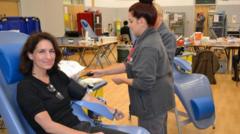Why Should Sixth Formers Step Up to Donate Blood?

Published: 2025-09-11 22:05:05 | Category: wales
The Welsh Blood Service is launching an urgent campaign, Gwaed Ifanc/Young Blood, to recruit a new generation of blood donors as the population ages. Currently, only 3% of the population donates blood regularly, with just 15% of those under 30 contributing. This initiative aims to encourage young people aged 17 and over to sign up, ensuring future blood supplies for hospitals across Wales.
Last updated: 20 October 2023 (BST)
Key Takeaways
- Around 100,000 blood donations are collected annually by the Welsh Blood Service.
- Only 3% of the overall population donates blood regularly.
- The campaign targets young people aged 17 and over to join the blood and stem cell registries.
- Young donors play a critical role in maintaining blood supplies for various treatments.
- Significant disparities exist in finding stem cell matches for patients from minority ethnic backgrounds.
The Need for Young Blood Donors
The Welsh Blood Service (WBS) has highlighted a pressing need for blood donors, particularly among the youth. As the population ages, a decline in regular donations could jeopardise the availability of blood for medical procedures. Currently, blood stocks are at a normal level, but proactive measures are essential to secure supplies for the future.
Understanding the Campaign: Gwaed Ifanc/Young Blood
The Gwaed Ifanc/Young Blood campaign is a strategic initiative aimed at increasing the number of young donors aged 17 and above. The campaign not only seeks to raise awareness about blood donation but also focuses on enrolling individuals in the stem cell registry. This dual approach addresses both immediate and future medical needs.
Why Young Donors Matter
Young donors are crucial for several reasons:
- They help maintain a stable blood supply for hospitals, ensuring that patients receive necessary treatments.
- Regular donors from younger demographics contribute to a sustainable blood donation culture, fostering lifelong habits.
- Engaging youth in blood donation can positively impact community health and awareness.
The Impact of Blood Donation
Each blood donation has the potential to save up to three lives. With the Welsh Blood Service collecting approximately 100,000 donations annually, the impact is significant. Blood is essential for various treatments, including:
- Cancer therapies
- Emergency care for traumatic injuries
- Support for mothers during childbirth
As Eleri Schiavone from the WBS stated, "We really need more young donors to come on board to sustain the future blood supplies for the 19 hospitals that we supply blood to in Wales." The need for consistent donations is clear, and young people can play a pivotal role in this mission.
Real Stories from Young Donors
Students at Ysgol Stanwell in Penarth, Vale of Glamorgan, are already embracing the call to donate blood. Head boy Saif, 17, expressed a sense of satisfaction in knowing his donation could help others. He mentioned receiving updates about how his blood was used, creating a tangible connection to his contribution.
Another student, Niamh, also shared her positive experience. Encouraged by her parents, she felt comfortable donating blood and was eager to continue. "It's something I'd do as many times as I could really," she stated.
Conversely, Elliot initially felt apprehensive about the pain involved in donating but found his fears unfounded after his first experience. "I would 100% do it again," he said, highlighting the positive attitudes among his peers towards blood donation.
The Importance of Diversity in Donor Registries
In addition to blood donations, the WBS is also focused on increasing diversity within its stem cell registry. Currently, about 2,000 individuals in the UK require a stem cell transplant each year, and finding a match can be challenging. Statistics reveal that three in ten patients will not find a suitable match, with that figure rising to seven in ten for those from black, Asian, mixed, or minority ethnic backgrounds. Thus, the campaign aims to recruit over 6,000 young people from these diverse backgrounds annually.
Encouraging a Culture of Giving
Educational institutions play a vital role in fostering a culture of giving. At Ysgol Stanwell, initiatives like blood donation drives are seen as crucial for developing responsible citizens. Deputy head teacher Sarah Owens remarked, "We want to encourage all of our young people to look at what they can give for their local community." This ethos aligns with the school's values of effort, kindness, and respect.
Supporting the Mission of the Welsh Blood Service
The partnership between schools and the Welsh Blood Service has proven effective. Since 2015, students and staff at Ysgol Stanwell have collectively saved up to 3,000 lives, with more than 120 students joining the stem cell registry. This collaboration serves as a model for other schools seeking to promote community engagement and health awareness.
What Happens Next?
As the Gwaed Ifanc/Young Blood campaign progresses, the Welsh Blood Service will continue to engage with young people, schools, and communities. The focus will remain on increasing donor numbers and ensuring that the blood supply meets future demands. Additionally, the campaign will work towards increasing the representation of minority ethnic groups within the stem cell registry.
Regular blood donation is not only a lifesaving act but also a pivotal habit that can lead to long-term community health benefits. By fostering early participation in blood donation, the Welsh Blood Service aims to build a reliable and diverse pool of donors, ensuring that blood supplies remain robust as the population ages.
FAQs
What is the age requirement for blood donation in Wales?
Individuals must be at least 17 years old to donate blood in Wales. The Welsh Blood Service encourages young people to participate and help maintain blood supplies.
How often can I donate blood?
In general, individuals can donate whole blood every 12 weeks. There are guidelines for other types of donations, such as platelets or plasma, which may differ in frequency.
Why is blood donation important?
Blood donation is crucial because each donation can save up to three lives. Blood is used for various medical treatments, including surgeries, cancer therapies, and emergency care for trauma patients.
How can I get involved in the Gwaed Ifanc/Young Blood campaign?
To get involved, young individuals can register to donate blood through the Welsh Blood Service's website or participate in local donation drives in schools and communities.
What happens to my blood donation?
After donating, your blood is tested for safety and compatibility, then processed and distributed to hospitals where it is needed for patients requiring transfusions or treatments.
As the Welsh Blood Service continues its vital mission, the involvement of young donors is more important than ever. Will you consider joining the ranks of lifesavers? #BloodDonation #YoungBlood #CommunityHealth


